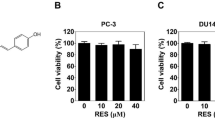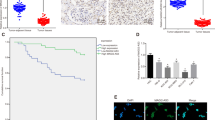Abstract
Androgen-independent prostate cancer is an aggressive disease with high angiogenic and metastatic potential. Increased microvessel density and altered invasion properties have previously been described in LNCaP-19, an androgen-independent subline to LNCaP. To characterize the differences in angiogenesis and invasion, the vessels of these tumour xenografts were investigated with immunohistochemistry, and the influence of tumour cells on endothelial cell migration, proliferation and tube formation was studied in vitro. The blood vessels of LNCaP were found to be stabilized by pericytes more frequently than vessels in LNCaP-19. Further, tumour cell invasion was decreased in pericyte-covered blood vessels in both the tumour types. LNCaP-19 displayed an increased potential to induce endothelial cell migration in vitro. In conclusion, pericyte coverage seems to be important for the invasion of tumour cells into blood vessels. Further, LNCaP-19 has lower pericyte coverage and an increased potential to induce endothelial cell migration, which reflects its high microvessel density.
This is a preview of subscription content, access via your institution
Access options
Subscribe to this journal
Receive 4 print issues and online access
$259.00 per year
only $64.75 per issue
Buy this article
- Purchase on Springer Link
- Instant access to full article PDF
Prices may be subject to local taxes which are calculated during checkout




Similar content being viewed by others
References
Folkman J . Tumor angiogenesis: therapeutic implications. New Engl J Med 1971; 285: 1182–1186.
Morikawa S, Baluk P, Kaidoh T, Haskell A, Jain RK, McDonald DM . Abnormalities in pericytes on blood vessels and endothelial sprouts in tumors. Am J Pathol 2002; 160: 985–1000.
Papetti M, Herman IM . Mechanisms of normal and tumor-derived angiogenesis. Am J Physiol Cell Physiol 2002; 282: C947–C970.
Bono AV, Celato N, Cova V, Salvadore M, Chinetti S, Novario R . Microvessel density in prostate carcinoma. Prostate Cancer Prostatic Dis 2002; 5: 123–127.
Khatami A, Pihl CG, Norrby K, Hugosson J, Damber JE . Is tumor vascularity in prostate core biopsies a predictor of PSA recurrence after radical prostatectomy? Acta Oncol 2005; 44: 362–368.
Weidner N, Carroll PR, Flax J, Blumenfeld W, Folkman J . Tumor angiogenesis correlates with metastasis in invasive prostate carcinoma. Am J Pathol 1993; 143: 401–409.
Häggström S, Bergh A, Damber J-E . Vascular endothelial growth factor content in metastasizing and nonmetastasizing dunning prostatic adenocarcinoma. Prostate 2000; 45: 42–50.
Kosaka T, Miyajima A, Takayama E, Kikuchi E, Nakashima J, Ohigashi T et al. Angiotensin II type 1 receptor antagonist as an angiogenic inhibitor in prostate cancer. Prostate 2006; 67: 41–49.
Franck-Lissbrant I, Haggstrom S, Damber JE, Bergh A . Testosterone stimulates angiogenesis and vascular regrowth in the ventral prostate in castrated adult rats. Endocrinology 1998; 139: 451–456.
Häggström S, Lissbrant IF, Bergh A, Damber JE . Testosterone induces vascular endothelial growth factor synthesis in the ventral prostate in castrated rats. J Urol 1999; 161: 1620–1625.
Stewart RJ, Panigrahy D, Flynn E, Folkman J . Vascular endothelial growth factor expression and tumor angiogenesis are regulated by androgens in hormone responsive human prostate carcinoma: Evidence for androgen dependent destabilization of vascular endothelial growth factor transcripts. J Urol 2001; 165: 688–693.
Best CJ, Gillespie JW, Yi Y, Chandramouli GV, Perlmutter MA, Gathright Y et al. Molecular alterations in primary prostate cancer after androgen ablation therapy. Clin Cancer Res 2005; 11: 6823–6834.
Gustavsson H, Welen K, Damber JE . Transition of an androgen-dependent human prostate cancer cell line into an androgen-independent subline is associated with increased angiogenesis. Prostate 2005; 62: 364–373.
Gustavsson H, Jennbacken K, Welen K, Damber JE . Altered expression of genes regulating angiogenesis in experimental androgen-independent prostate cancer. Prostate 2008; 68: 161–170.
Jennbacken K, Gustavsson H, Welén K, Vallbo C, Damber J-E . Prostate cancer progression into androgen independency is associated with alterations in cell adhesion and invasivity. Prostate 2006; 66: 1631–1640.
Tesan T, Jennbacken K, Welén K, Damber JE . Differential expression of angiopoietin-2 and vascular endothelial growth factor in androgen-independent prostate cancer models. BJU Int 2008; doi:10.1111/j.1464-410x.2008.07768.x.
Eberhard A, Kahlert S, Goede V, Hemmerlein B, Plate KH, Augustin HG . Heterogeneity of angiogenesis and blood vessel maturation in human tumors: implications for antiangiogenic tumor therapies. Cancer Res 2000; 60: 1388–1393.
Xian X, Håkansson J, Ståhlberg A, Lindblom P, Betsholtz C, Gerhardt H et al. Pericytes limit tumor cell metastasis. J Clin Invest 2006; 116: 642–651.
Yonenaga Y, Mori A, Onodera H, Yasuda S, Oe H, Fujimoto A et al. Absence of smooth muscle actin-positive pericyte coverage of tumor vessels correlates with hematogenous metastasis and prognosis of colorectal cancer patients. Oncology 2005; 69: 159–166.
Jain RK, Baxter LT . Mechanisms of heterogeneous distribution of monoclonal antibodies and other macromolecules in tumors: Significance of elevated interstitial pressure. Cancer Res 1988; 48: 7022–7032.
Netti PA, Roberge S, Boucher Y, Baxter LT, Jain RK . Effect of transvascular fluid exchange on pressure-flow relationship in tumors: a proposed mechanism for tumor blood flow heterogeneity. Microvasc Res 1996; 52: 27–46.
Dickson PV, Hamner JB, Sims TL, Fraga CH, Ng CY, Rajasekeran S et al. Bevacizumab-induced transient remodeling of the vasculature in neuroblastoma xenografts results in improved delivery and efficacy of systemically administered chemotherapy. Clin Cancer Res 2007; 13: 3942–3950.
Inai T, Mancuso M, Hashizume H, Baffert F, Haskell A, Baluk P et al. Inhibition of vascular endothelial growth factor (VEGF) signaling in cancer causes loss of endothelial fenestrations, regression of tumor vessels, and appearance of basement membrane ghosts. Am J Pathol 2004; 165: 35–52.
Mancuso MR, Davis R, Norberg SM, O’Brien S, Sennino B, Nakahara T et al. Rapid vascular regrowth in tumors after reversal of VEGF inhibition. J Clin Invest 2006; 116: 2610–2621.
Bergers G, Song S, Meyer-Morse N, Bergsland E, Hanahan D . Benefits of targeting both pericytes and endothelial cells in the tumor vasculature with kinase inhibitors. J Clin Invest 2003; 111: 1287–1295.
Benjamin LE, Golijanin D, Itin A, Pode D, Keshet E . Selective ablation of immature blood vessels in established human tumors follows vascular endothelial growth factor withdrawal. J Clin Invest 1999; 103: 159–165.
Acknowledgements
We thank Anita Fae for skilful technical assistance and MSc Heléne Gustavsson for fruitful scientific discussions and input on this paper.
Author information
Authors and Affiliations
Corresponding author
Rights and permissions
About this article
Cite this article
Welén, K., Jennbacken, K., Tes̆an, T. et al. Pericyte coverage decreases invasion of tumour cells into blood vessels in prostate cancer xenografts. Prostate Cancer Prostatic Dis 12, 41–46 (2009). https://doi.org/10.1038/pcan.2008.33
Received:
Accepted:
Published:
Issue Date:
DOI: https://doi.org/10.1038/pcan.2008.33
Keywords
This article is cited by
-
The cell-line-derived subcutaneous tumor model in preclinical cancer research
Nature Protocols (2022)
-
Prostaglandin E2 breaks down pericyte–endothelial cell interaction via EP1 and EP4-dependent downregulation of pericyte N-cadherin, connexin-43, and R-Ras
Scientific Reports (2020)
-
Carbonic anhydrase 2 (CAII) supports tumor blood endothelial cell survival under lactic acidosis in the tumor microenvironment
Cell Communication and Signaling (2019)



